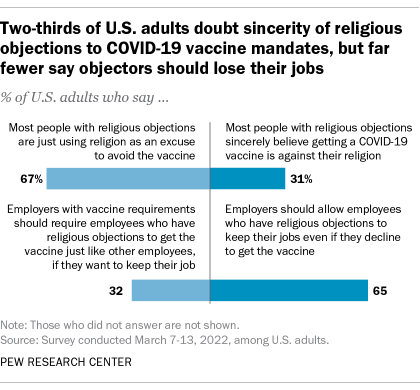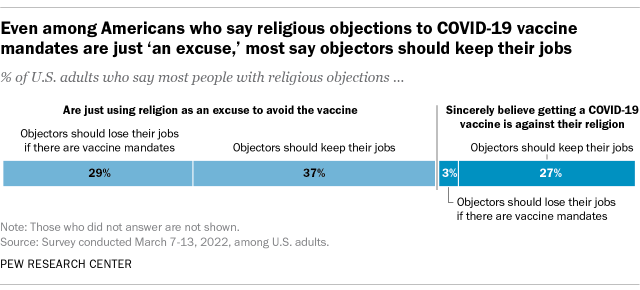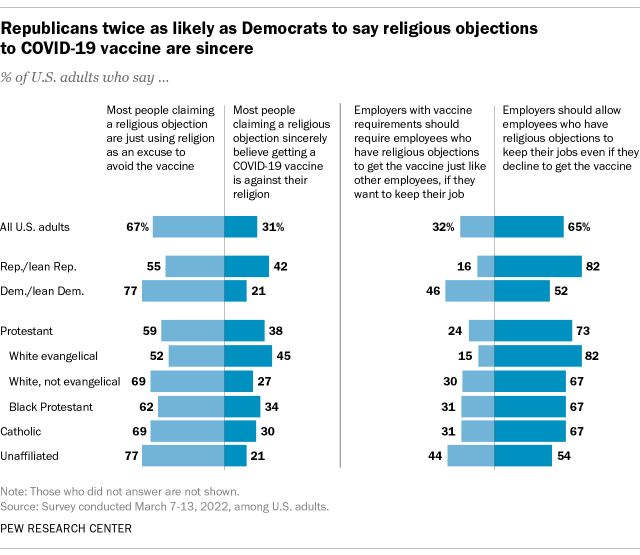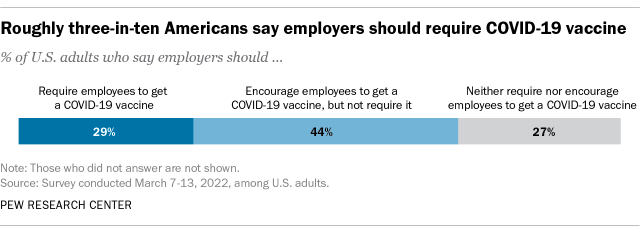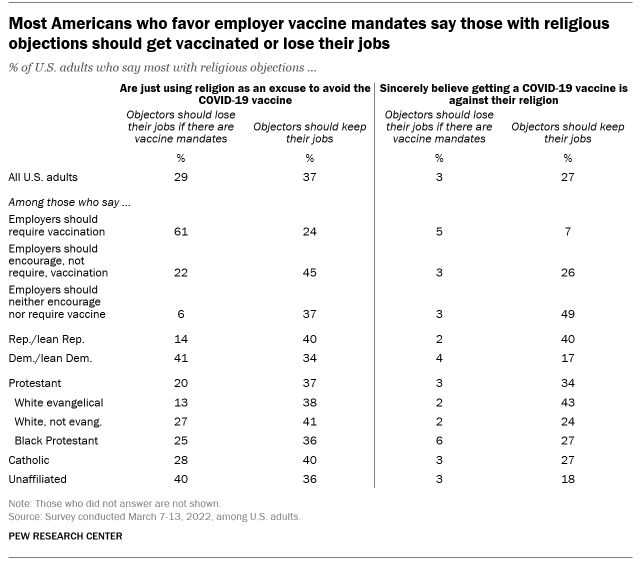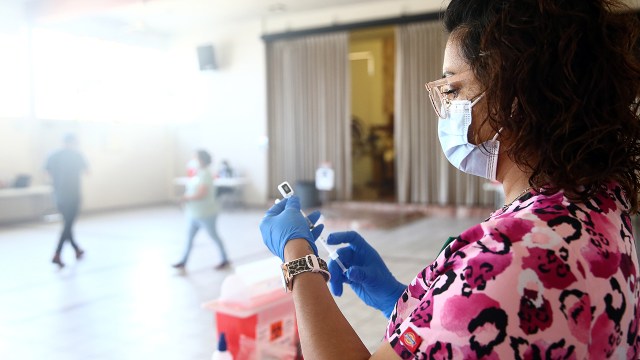
While many public and private employers in the United States have required workers to be vaccinated against COVID-19, some are allowing exemptions for people who say the vaccine violates their religious beliefs. But most U.S. adults do not believe that these requests for religious exemptions are sincere, according to a new Pew Research Center survey.
Two-thirds of U.S. adults say most people who claim religious objections to a COVID-19 vaccine “are just using religion as an excuse to avoid the vaccine,” while about a third (31%) say they think the objectors “sincerely believe getting a COVID-19 vaccine is against their religion.”
At the same time, most Americans do not think those with religious objections to the COVID-19 vaccine – regardless of the sincerity of their beliefs – should lose their jobs. A majority of adults (65%) say employers that require coronavirus vaccinations should “allow employees who have religious objections to keep their jobs even if they decline to get the vaccine.” Around a third (32%) disagree, saying the employers should “require employees who have religious objections to get the vaccine just like other employees, if they want to keep their job.”
Pew Research Center conducted this study to explore how Americans view COVID-19 vaccine mandates and the religious exemptions that sometimes accompany them. For this analysis, we surveyed 10,441 U.S. adults from March 7-13, 2022. Everyone who took part in this survey is a member of the Center’s American Trends Panel (ATP), an online survey panel that is recruited through national, random sampling of residential addresses, which gives nearly all U.S. adults a chance of selection. The survey is weighted to be representative of the U.S. adult population by gender, race, ethnicity, partisan affiliation, education and other categories. Read more about the ATP’s methodology.
Here are the questions used for this analysis, along with responses, and its methodology.
Even among those who say most religious objectors are just using religion as an excuse to avoid the vaccine, there are more people who think religious objectors should be allowed to keep their jobs (37% of all U.S. adults) than think religious objectors should be required to get the vaccine to remain employed (29%).
Meanwhile, the overwhelming majority of those who say religious objections to COVID-19 vaccines are sincere also say that objectors should be able to keep their jobs, despite employers’ vaccine mandates (27% of all U.S. adults). Just 3% of adults say religious objectors’ reasoning is sincere but they should still lose their jobs for refusing vaccination.
There are notable differences on these questions by party identification and religious affiliation. But even among Republicans and White evangelical Protestants – two groups with comparatively low vaccination rates – half or more express skepticism of religious objections to COVID-19 vaccines.
Roughly four-in-ten Republicans and independents who lean toward the Republican Party (42%) believe that most people who say they have a religious objection to getting the coronavirus vaccine sincerely believe getting the vaccine is against their religion; a larger share (55%) say these individuals are just using religion as an excuse to avoid vaccination. About half of White evangelicals also believe religious objections are largely insincere (52%).
Among Democrats and those who lean toward the Democratic Party, a large majority (77%) say these objectors are just using religion as an excuse. An identical share of religiously unaffiliated Americans – those who describe themselves as atheist, agnostic or “nothing in particular” – express the same view.
Republicans are largely united behind the idea that those who refuse a COVID-19 vaccine on the basis of religion should not lose their jobs. Around eight-in-ten Republicans (82%) say employers that require coronavirus vaccinations for their workers should allow employees with religious objections to keep their jobs, even if they decline to get the vaccine.
Democrats are much more evenly divided on this question: About half (52%) say employers should allow those with religious objections to COVID-19 vaccines to keep their jobs, while 46% disagree, saying that workers should have to comply with their employers’ vaccine mandates to stay employed.
Roughly eight-in-ten White evangelical Protestants (82%), a religious group that largely supports the GOP, say employers with coronavirus vaccine requirements should allow those with religious objections to keep their jobs even if they refuse the vaccine. The religiously unaffiliated, who are largely Democratic, are much more split, with 54% saying vaccine objectors should be able to keep their jobs without getting vaccinated and 44% saying they should be required to get vaccinated in order to keep their jobs.
The survey also asked Americans whether they believe employers should be mandating the COVID-19 vaccine to begin with. Roughly three-in-ten adults (29%) say employers should require employees to get a coronavirus vaccine. Another 44% of Americans say employers should encourage but not require workers to get a coronavirus vaccine, and 27% say employers should neither require nor encourage employees to get vaccinated.
Among those who say employers should require vaccination for their workers, two-thirds say employees should have to comply with their employer’s vaccination mandate to keep their jobs, even if they have religious objections. That includes 61% who doubt the sincerity of religious objectors and a small segment (5%) who think people’s religious objections are sincere.
At the other end of the spectrum, those who say employers should neither require nor encourage vaccines overwhelmingly agree that religious objectors should be allowed to keep their jobs. In this group, 86% say these individuals should remain employed even if they don’t get a COVID-19 vaccine, including substantial shares who think religious objections are sincere (49%) and who do not (37%).
Note: Here are the questions used for this analysis, along with responses, and its methodology.



